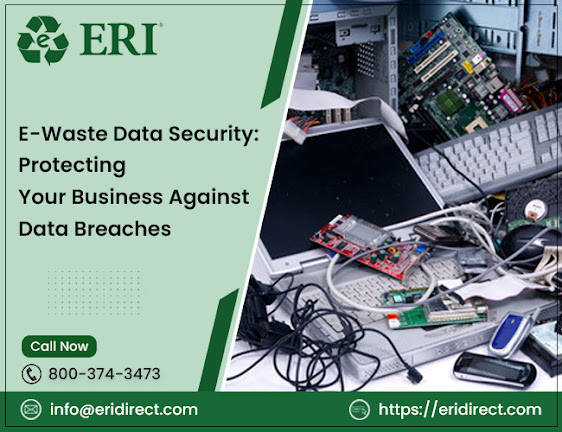With the world being increasingly powered by technology, ethical recycling services cannot be ignored anymore. With the rapid growth in the usage of electronic devices, batteries - or rather alkaline batteries - are becoming a necessity in our lives. The alkaline batteries that power our normal household items, remote control, toys and flashlights activate our equipment. However, these batteries can have significant environmental and safety effects if properly not dealt with. This is the place where the alkaline battery recycling comes into play.
While consumers don't always have battery recycling in mind, increased demand for green solutions and data security has put the industry back on track for safe disposal and recycling. The post below explains the importance of alkaline battery recycling, its relation to data destruction, and why companies and individuals should utilize an alkaline battery recycling service for environmentally friendly and safe disposal.
Understanding Alkaline Battery Recycling
Alkaline batteries are the most common disposable batteries found in homes and workplaces. The alkaline battery contains toxic chemicals such as zinc and manganese and other metals that will be harmful when it is uncontrolled in the environment. They bite water and ground to dispose of landfills and leave for leakage and can cause permanent long -term damage to the ecosystem.
The recycling of alkaline batteries involves safe processing, recycling and reuse of materials used in these batteries. Recycling alkaline batteries can neutralize or recycle toxic chemicals, such as they cannot ruin the environment in landfill by their way. Recycling also allows for conservation of valuable resources such as zinc, steel and manganese as new batteries and other products are rebuilt when they are produced.
Why Recycling an Alkaline Battery is Important?
- Environmental Protection: Chemicals within alkaline batteries, including mercury, lead and cadmiums, are not just detrimental to the environment, but also pose health hazards to human beings. When these chemicals leak into air, water or soil by unfair disposal, they can lead to long -term ecosystem disruption in the local region. Recycling minimizes the environmental impact by treating these materials and reusing them in a secure manner.
- Waste Reduction: The battery contributes a lot to the continuous waste problem. Alkaline battery recycling service helps customers and businesses to avoid inserting products in landfills, where they persist for hundreds of years before disintegrating. Every battery recycled helps prevent more waste from accumulating, fostering a cleaner, greener planet.
- Legal Compliance and Corporate Responsibility: For businesses, responsible disposal of dangerous materials including batteries often require. Recycling alkaline batteries ensures that businesses meet environmental rules, avoid potential penalties, and display a commitment to stability.
- Protection of Resources: The components of alkaline batteries such as steel, manganese and zinc are limited resources. Recycling the batteries saves us from the extraction and mining of raw materials, which conserves natural resources for the future. Recycling corrects these metals and makes them available for use in new products, which decreases the demand for raw materials.
Data Destruction and Alkaline Battery Recycling
While the relationship between data destruction and recycling of alkaline batteries is not necessarily a foregoing conclusion, two activities share similarities in which they include both valuable resources protecting and discovered from confidential data. Data destruction is the process of overwriting or physically destroying data on a hard disk, server, or other media so that it can no longer be accessed by unauthorized individuals and protect against privacy violations.
Though destruction of data protects computer data, recycling of alkaline batteries avoids the destruction of toxic materials and decreases damage to human beings and the environment. Proper recycling and disposal of materials such as batteries are of utmost importance to business entities and institutions handling sensitive information. These types of companies will usually ensure safe data destruction procedures, but they have to also ensure other electronic waste, such as used batteries, is being destroyed properly.
The Role of Alkaline Battery Recycling Services
Recycling units for alkaline batteries are now mandatory for consumers and businesses in the attempt to enable them to recycle old batteries safely. Recycling units enable people to gather and recycle their batteries in a simple and safe manner so that they won't be disposed of in landfills where they might cause harm.
This is how an alkaline battery recycling unit works:
- Sorting and Collection: These organizations have collection points or pick-up centers for batteries, and thus it is easy for individuals and companies to dispose of their used alkaline batteries. Batteries are sorted so that the right material to recycle can be identified.
- Safe Processing: Reputable alkaline battery recycling service providers use advanced technology to recycle the alkaline battery and process and destroy them in a safe environment. They fix metals such as zinc and manganese, which are naturally valuable and can be recycled to create new batteries and other items.
- Compliance and Documentation: Recruitment of alkaline batteries ensures compliance with local as well as international laws. All services provide documentation that ensures safe recycling and battery disposal, which is necessary for business organizations that legally monitor their waste disposal process.
- Environmental Benefits: Through the services of a professional company, customers are guaranteed that their battery is in the hands of experts who care for stability. They keep in mind that the entire recycling process from the collection makes sure to settle with the guarantee that toxins never reach the environment.
Conclusion
Increased relevance of alkaline battery recycling services highlights the necessity of environmentally friendly and sustainable methods in our technology-driven world. Recycling alkaline batteries is one way in which we can make the environment safe, preserve resources, and promote cleaner, greener options.
Whether individually or as a company, the right thing to recycle batteries and other electronic materials makes a substantial difference. To a consumer on the lookout for a reliable, green solution, searching for an experienced alkaline battery recycling company is a simple yet effective first step towards helping clean up the planet.

.jpeg)
.jpeg)
.jpeg)
.jpeg)
.jpeg)
.jpeg)
.jpeg)







